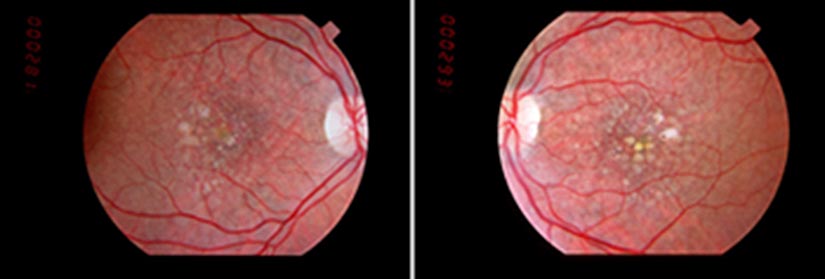Understanding Macular Degeneration and Protecting Your Vision
Learn about the causes, symptoms, and advanced treatment options for dry and wet macular degeneration with the expert team at Eye Consultants.
Macular degeneration affects cells in the macula, which is the part of the retina responsible for central vision. Central vision is essential for most basic tasks like reading, driving, recognizing people, etc. Although macular degeneration leaves peripheral vision un-impaired, it can be quite debilitating in its advanced state.
The disease exists in two forms, dry and wet. Dry macular degeneration is by far the most common. It is the milder of the two forms, develops gradually, and often leads to only minor vision loss.
Wet macular degeneration is less common, but the vast majority of severe vision loss cases result from this form. First, abnormal blood vessels form underneath the surface of the retina. Leakage of blood and other fluids from these blood vessels distort the retina and can permanently damage the photosensitive retinal cells.
The primary cause of macular degeneration remains unknown. Macular degeneration typically occurs more frequently in the aging population with patients over 60. Research has shown there are many other factors, including family history, smoking, hypertension, obesity, high cholesterol, or a high fat diet that may influence the development of macular degeneration.
Macular degeneration symptoms may include:
- Shadows, blurriness, or holes in the center of vision
- Straight lines appear wavy
- Trouble seeing details both up close and at a distance
- Difficulty telling colors apart, especially ones close in hue
- Vision can be slow to come back after bright light exposure

Treatment for dry macular degeneration:
Patients with dry macular degeneration are encouraged to eat foods rich in antioxidants or omega-3 fatty acids such as leafy green vegetables, colorful fruits and vegetables, fish and nuts. A daily supplement containing the Age Related Eye Disease Study (AREDS) formula of antioxidants and zinc is also recommended. Smoking cessation is critical, as smoking is a major risk factor for progression of the disease.
Treatments for wet macular degeneration:
The most common treatment for wet macular degeneration is the injection of medications which slow or stop abnormal blood vessel growth. They are known as anti-VEGF (anti-vascular endothelial growth factor) drugs. There are a variety of drugs that can be used for this purpose. These treatments are usually administered by ophthalmologists with advanced training in retinal disease treatment.
My experience was excellent! There was very little wait time and the exam moved along smoothly. The Tech and Dr. Edmons were both friendly and outgoing making the appointment enjoyable. Both my wife and I are very happy to have Eye Consultants caring for our vision.
– Charles Dotson
Ready to See Clearly and Live Fully?
Experience expert eye care with personalized treatments designed just for you. Whether you need a routine exam, advanced surgery, or relief from eye discomfort, Eye Consultants is here to help.
